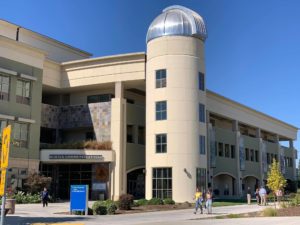
Under the leadership of Trustee Beggs and her colleagues on the YCCD Board, the district has completed a broad range of improvements including:
Academics & Job Skills
- Offered a new four-year degree in Respiratory Care at MJC.

- Launched the Guided Pathways program this fall, providing students a clear “road map” from registration to graduation, with integrated guidance and support. We are one of only 20 community colleges chosen to pilot this program.
- Entered into “dual enrollment” agreements with area high schools to give high school students access to college courses on their own campuses, and allowing them to receive both high school and college credits.
- Pivoted astonishingly quickly mid-semester from face-to-face instruction to remote instruction and have since certified the faculty in online teaching.
- Provided faculty and students with upgraded equipment to improve the online teaching and learning.
- Used Measure E funds to develop the new Great Valley Outdoor Lab to showcase native habitat for K-14 students.

- Brought classes to the incarcerated in area prisons, to support their education, rehabilitation and job prospects upon release.
- Completed our Integrated Plan: Basic Skills Initiative, Student Equity, and Student Success and Support Program.
- Awarded another 5-year grant from the U.S. Department of Education, funding our TRIO Student Support Services program which helps veterans, low-income, first-generation, and students with disabilities thrive and graduate.
- Recognized by both the National Agriculture Science Hall of Fame and California Outstanding Community College Agriculture Program for our outstanding Agriculture programs.
- Increased our Career Technical Education (CTE) partnerships with the business community.
- Funded 21 CTE projects with Strong Workforce grants in the last five years, including developing curriculum for a Cyber Security program, expanding the the Welding program, and creating a new program in Engineering & Industry Automation.
- Earned recognition for 19 MJC CTE programs, named “Strong Workforce Stars” by the California Community Colleges Chancellor’s Office.
Fiscal Stability
- Hired a new open-minded chancellor who has restructured and streamlined the district’s administrative structure.
- Required the chancellor to identify and implement financial efficiencies in all operations.
- Improved accountability for employee travel by requiring monthly travel reports as specified by Policy 7400.
- Improved transparency and accountability by tightening rules for no-bid contracts.
- Instituted a pre-COVID-19 hiring freeze because of looming pension liabilities and erratic, ever-changing state funding formulas, putting us in good position to avoid layoffs.
- Agreed to maintain a prudent 10% reserve. (5% is generally considered minimal.)
- Maintained an excellent credit rating according to both Moody’s Investor Services and S&P Global Ratings.

- Continued maintenance & remodeling of designated buildings under Measure E.
- Opposed (and voted against) putting multiple new administrative hires into higher salary brackets than warranted by usual standards of placement.
- Currently exploring a proposal to refinance eligible General Obligation Bonds to lower the tax burden on local taxpayers by an estimated $1.9 million over the life of the bonds.
Free Speech & Civil Discourse
- Protected Academic Freedom and freedom of expression for both students and faculty in consultation with faculty leaders.
- Held Office Hours to welcome all views, hear all stakeholders, and listen to all perspectives, both on campus and off.
- Met individually with, and ensured feedback from, the Faculty Liaison, YFA and CSEA (faculty and staff union) leaders.
- Remained a strong advocate for maintaining the Faculty Liaison position.
- Encouraged regular collegial meetings between constituent group leaders and the chancellor and presidents, a practice that had been discontinued by prior administrations.
- Hired a chancellor who doesn’t endorse the “rubber-stamp” model of trusteeship favored by many CEOs -- a model that disenfranchises constituent groups and the community to which trustees are accountable.
- Crafted a landmark Due Process Policy that provides consistency and fairness in handling investigations involving students, volunteers and all employees, anticipating recent legal changes in Title IX guidance at the federal level.
- Helped draft the District’s annual Strategic Priorities, including #5 from our 20-21 Strategic Priorities list: “Foster an institutional culture that creates a positive educational environment, including utilizing principles that are guided by due process, open discourse, academic freedom, and viewpoint diversity.”
- Helped improve communication, understanding, morale and respect for minority viewpoints at the board, faculty and campus levels.
- Revised the Board’s Resolution on Racism draft, which passed unanimously.